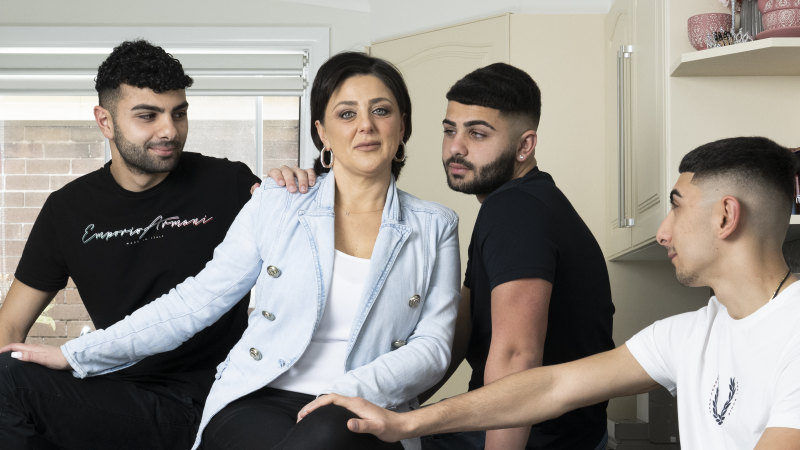Save articles for later
Add articles to your saved list and come back to them any time.
Australians with rare, incurable and end-stage cancers are being given hope that they may no longer be facing a death sentence with a world-first program bringing the most advanced and previously unattainable cancer-fighting tools to them for free.
Over the next two years, 23,000 patients across the nation – from our major cities to regional and remote towns, and indigenous communities – will have access to the world’s largest cancer genomic initiative that will see the world’s best specialists create personalised treatments for them here, without having to spend hundreds of thousands of dollars to find them overseas.
Heidi Wehbe, who is battling stage four bowel cancer (with her three sons, Anthony 19, Steve 17 and Daniel 15) has been part of a new targeted treatment trial that has seen her cancer greatly reduced.Credit: Photo: Janie Barrett
Cancer is caused by alterations in a person’s DNA. By individually mapping each patient’s DNA sequence, specialists can accurately identify and target the cause of the cancer. The cost of this life-saving science has previously meant it was unattainable to most people and, additionally, once a profile had been established, clinical trials overseas were often out of financial reach to most patients, if they were even well enough to travel to access them.
Led by not-for-profit organisation Omico, and run out of the University of NSW’s newly created Centre for Molecular Oncology, the initiative, called PrOSPeCT, will be powered by $185 million of public and private funding and is expected to create 650 jobs, on top of saving lives.
Rare Cancers Australia general manager Christine Cockburn said PrOSPect was “a real game changer” and “a fundamental paradigm shift” in the way cancer is treated in Australia.
“It’s entirely possible that the outcomes from precision medicine will make survival with a rare cancer a reality. Certainly, we can expect people to live longer and to live better, and to have a more fair chance at living well. It gives hope that people are no longer facing a death sentence,” she told the Herald.
“When we start to look at things genomically then we start to understand the fingerprint of the cancer and that is previously a detail that we didn’t have. We can understand what’s making it tick, what’s inside it, then we can match it with really effective and innovative new medicine, we can treat it quickly and more effectively.”
Belfield mother-of-three Heidi Wehbe was just 38 when she found out she had stage four bowel cancer. She was told she had a 5 per cent chance of survival. That was in 2021.
“After the second round of chemotherapy, I was told I had three months to live. If I had to stay on chemotherapy, I don’t think I would have had the strength or the will to keep fighting for survival, I would have given up.”
Wehbe’s specialist arranged for her to undergo genomic testing and through that, a personalised treatment program was created, and she was subsequently accepted into an early stage clinical trial.
“It’s meant the world to me because it’s obviously given me more time to be here with my family. It’s given me more hope. I’ve got a better quality of life. My hair is starting to grow back, and really I wasn’t meant to make it until Christmas. And I’ve now done two Christmases, and I’m still here with my family, so I can’t ask for anything more.”
Oncologist and Omico founder and CEO Professor David Thomas said the program would allow the identification of otherwise unsuspected drug targets for patients who “desperately need them”, and would unify Australia’s cancer network, putting the nation on the cancer-fighting global stage and entice those in “big industry” who make cancer drugs to Australia.
“Too often patients run out of treatment options, that happens all too frequently with patients with rare cancers which is a very large fraction of patients who die from cancer in this country. So, this is offering them hope that it no longer has to be a tragedy,” Thomas said.
“A tragedy that you can’t alter just remains a tragedy. A tragedy where there’s a potential way of changing things is an opportunity, and that opportunity has come late in my career, but it’s very exciting to see it happen.”
Dr Mandy Ballinger, Omico head of cohorts, said while genomic testing itself had been around for some time, it had not been broadly available and as the initiative continued, the database of biodata – estimated to be 70,000 profiles over the next 10 years – could see the eradication of cancer.
“Gathering information on all of all these types of cancers, including the rare cancers, gives us a really valuable data set to be able to be used for research so that we know where the needs are in terms of future treatments,” she said.
It is anticipated the initiative will bring $135 million in savings to our under-sieged health system, as well as encourage international investment in Australia’s medical research.
Assistant Federal Minister for Rural and Regional Health Emma McBride said ensuring all Australians had access to affordable care was important and PrOSPeCT demonstrated a commitment to building an internationally recognised medical sector.
NSW Health Minister Ryan Park said being able to embrace innovative and world-leading treatments and methods was a ministerial priority.
The Morning Edition newsletter is our guide to the day’s most important and interesting stories, analysis and insights. Sign up here.
Most Viewed in National
From our partners
Source: Read Full Article




